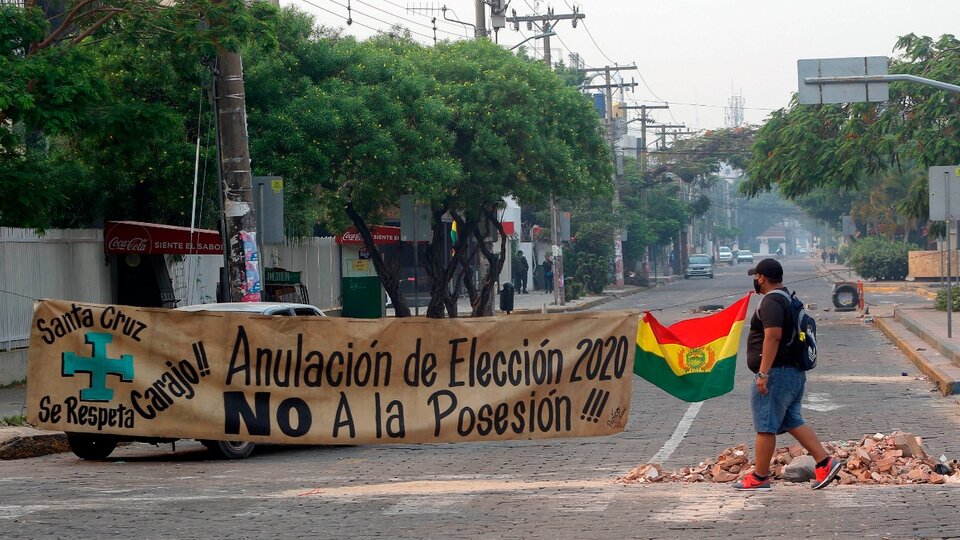
[ad_1]
From La Paz.Bolivia is a troubled river of events less than 48 hours after the inauguration of Luis Arce and David Choquehuanca. This is an unusual situation: a disorderly retreating de facto government with a mixture of flight and desperate movements, and a government elected under threat and with great popular support.
The last of these threats to act was the dynamite attack on the premises of the Movement for Socialism (MAS) where Arce was located, which occurred Thursday evening in the city of La Paz. The detonation took place after a new attempt to mobilize the right-wing sectors who denounced the electoral fraud and demanded the suspension of the nomination.
The attempt to generate strong actions in La Paz has not been successful so far. The city is calm, with its normalized activities, without quarantine. Outbreaks of protest remained in areas strong on the right, in Santa Cruz and, to a lesser extent, in Cochabamba, in what is the current geography of the Bolivian conflict: with strength in the east, less capacity in the center , until little or no little at the center of political power of La Paz.
The protests also did not show much popular support in the main Santa Cruz stronghold. Where a “civic strike” announced by the Civic Committee began on Friday, tensions have been reported between those leading the blockades and residents of certain neighborhoods for lack of consensus. In Cochabamba, where the right has deployed armed groups, clashes with transporters have been reported.
Rómulo Calvo, president of the Committee, who asked Jeanine Añez to suspend the investiture of next Sunday, affirmed Friday afternoon that “unfortunately the most important actions that our president should have taken, such as stopping the change of hand, he did not do it, he leaves a country in the throes of convulsions ”.
Along with street actions without the repercussions expected by their leaders, there have been new attempts to ignore the election results of October 18. The main event took place on Thursday with a letter sent by Supreme Electoral Tribunal (TSE) member Rosario Baptista to Organization of American States (OAS) Secretary General Luis Almagro requesting a “specialized audit and independent”. , because of “the possible existence of an alternative, technically reserved data block, with privileged, restricted and secret access (…) which could have conditioned the final result”.
The letter Baptista sent prompted other right-wing leaders to join in questioning the October 18 result, such as Jorge Quiroga, who withdrew from his presidential bid shortly before the race. Carlos Mesa, second in the elections -with 26 points less than Arce-, asked the TSE to explain the letter presented by Baptista.
The TSE plenary hall, headed by its president Salvador Romero, again ratified the election results at a press conference. Carter Center mission chief José Antonio de Gabriel, who was part of election observation, also supported the result: “When an election that has been conducted with such transparency is called into question, it is very important transparent concrete data is provided (…) and does not simply cast a shadow of doubt ”.
In this context, the de facto government is sending out various messages. On the one hand, the Minister of the Presidency, Yerko Nuñez, also requested an audit of the TSE. On the other hand, Añez, sent a closing message from the management, and as to Arturo Murillo, who was de facto government minister, it is speculated that he might try to escape the country, hypothesis which takes force with the notification made by the immigration justice on the ban to leave the country of Murillo and Fernando López – former de facto Minister of Defense.
The last minute plan of a sector of the right then seems to be sinking due to the weak social consensus, the lack of unity and the late activation of actions. Meanwhile, on Friday morning, Arce and Choquehuanca were in the Tiwanaku, where an offering was made to Pachamama, and both received the staff of the amautas “to reign in peace, prosperity and unity”, according to the new president of Bolivia who will take office on Sunday.
In central La Paz, the first indigenous social movements from different parts of the country have already started to meet in Murillo Square. The arrival of Central Obrera Boliviana who has declared himself urgently and is on the lookout because of threats from sectors of the putschist right. The inauguration of the new government will be accompanied in the streets by those who organized months of resistance, first to prevent the coup, then before its impositions, persecutions and massacres, and finally to carry out the elections that gave victory at the MAS. .
Sunday will be followed by the arrival of Evo Morales in Villazón on Monday, from where a large caravan will depart which is expected to be packed until it reaches Chimoré on November 11., with a great symbolic charge since, from this place, exactly one year before, he had to leave the country following the coup d’état and the unleashed persecution. With the capture of Arce and Choquehuanca, and the return of Morales, a new stage will have begun in Bolivia, complex and under the announced sieges of a sector of the right.
.
[ad_2]
Source link
 Naaju Breaking News, Live Updates, Latest Headlines, Viral News, Top Stories, Trending Topics, Videos
Naaju Breaking News, Live Updates, Latest Headlines, Viral News, Top Stories, Trending Topics, Videos